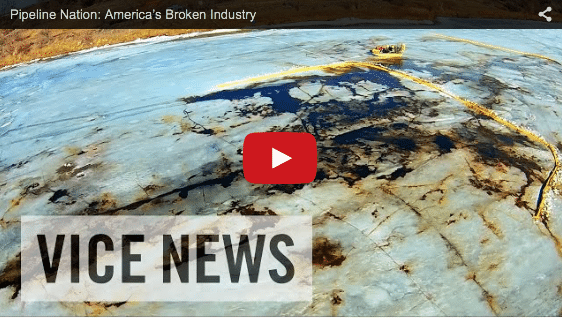In a new short documentary called “Pipeline Nation: America’s Broken Industry,” Vice News travels to Glendive, Montana, where a pipeline ruptured on January 17 of this year, spilling 50,000 gallons of crude oil into the Yellowstone River and contaminating the town’s drinking supply.
This was the second oil spill in the area in the past four years. An Exxon pipeline spilled over 60,000 gallons of crude into the Yellowstone River near Billings, Montana in 2011.
The spill near Glendive involved Bakken crude, which is lighter and more volatile than heavy crude and evaporates more quickly, making it difficult to clean up.
“Our recovery of oil out of the water, it’s just… we’re not really getting much,” Paul Peronard, On-Site Coordinator for the EPA, tells Vice’s Nilo Tabrizy in the film. “Three-hundred-something barrels out of the pipeline in this immediate area, less than a couple barrels actually out of the water. So pretty much what is in the water is there and gone. And we aren’t going to recover it.”
“We never — and I’ll be clear about that — we never recover all the oil. Somebody who tells you that is telling you stories. In good conditions, you get half of the oil that hits the water.”
The problem mainly stems from the United States’s aging pipeline infrastructure, which includes some 2.5 million miles of pipe that transports both oil and natural gas around the country. Peronard tells Vice, “From my standpoint as a spill responder, I’d like to see a lot more newer pipelines. Because we move lots of oil in this country… We need the oil. As long as we do, I’d like to see a safer infrastructure.”
As Vice notes, “Despite calls for stricter regulations over the last few years, the rules governing the infrastructure have largely remained the same.” Why hasn’t the Department of Transportation’s Pipeline and Hazardous Materials Safety Administration, which refused to comment for Vice’s documentary, done anything to force pipeline companies to upgrade their crumbling systems?
Carl Weimer, executive director of the Pipeline Safety Trust, tells Tabrizy there’s a pretty simple answer to that question.
“Right now the regulations are, to a grand degree, left up to the industry to decide themselves. Every company has a different plan, every company is looking at risk differently, so there’s lots of wiggle room in how the companies interpret the regulations. That makes those regulations really hard to enforce, and it leaves way too much up to the industries themselves.”
The DOT recorded 73 pipeline accidents last year, which Vice says is an 87% increase over 2009. The Bakken shale boom began in 2010.
Subscribe to our newsletter
Stay up to date with DeSmog news and alerts






